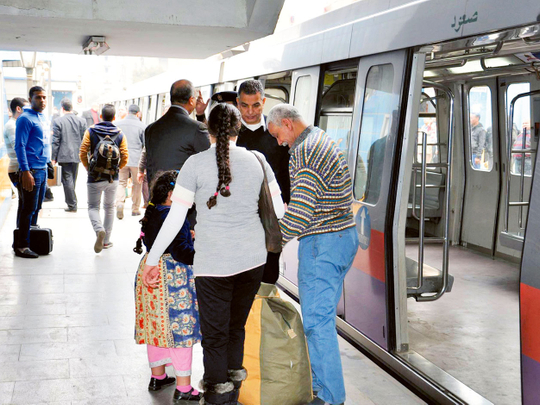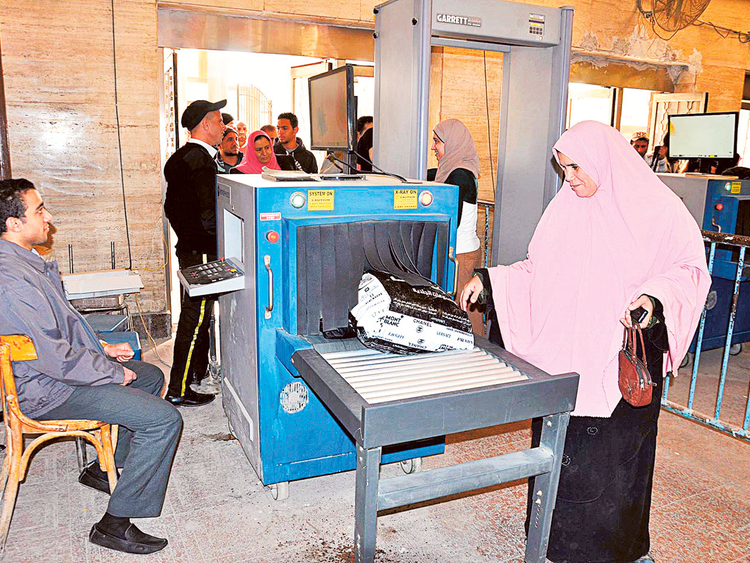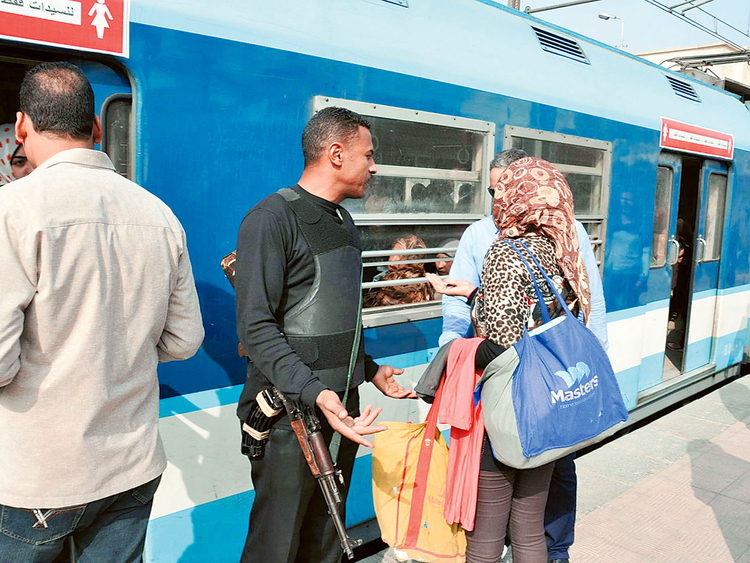
Cairo: For years, Faraj Radwan, a construction worker, used to take his iron instruments along on his subway journey from his house in the Cairo suburb of Al Marj to different sites of his workplace in Helwan in the south of the Egyptian capital.
Not any more.
Under new regulations announced by the state-run company behind the Cairo subway, items like Radwan’s tools are banned from being carried aboard the metro trains that shuttle between suburbs of the sprawling city.
The list of the prohibited items also include weapons, fireworks, inflammable liquids, gas cylinders, suitcases, large cardboard boxes, household appliances, animals, birds, fluorescent lamps and computer screens.
Violators risk an on-the-spot fine ranging from 15 (Dh5.3) to 100 Egyptian pounds, depending on the banned object.
“Since this decision was made, I stopped riding the metro with my tools,” Radwan told Gulf News.
“Now my journey takes more than two hours because I have to take two different microbuses in order to reach my workplace. It also costs much more. Now I pay at least four pounds, while the journey on the metro costs only one pound and takes around an hour.”
Items banned
In announcing the list of the banned items, the subway operator did not give an explanation. However, Radwan believes that the motive for the decision is purely financial.
“The government wants to collect money from the people in any way. But first, they must stop those passengers who ride the metro without tickets.”
Agreeing, Sobhy Kamal, a university student, is critical of the decision.
“A few days ago, I was stopped at the Shouhda station because I had a suitcase,” he said, referring to a main subway station in Cairo’s central train area of Ramsis.
“I shelled out a fine of 15 pounds on the pretext that I violated the ban. This is nonsense. The metro is supposed to serve the rail network in Cairo. But the government wants to get money out of thin air.”
The controversial decision comes amid official hints that the fare of the metro, used by an estimated 3.5 million commuters daily, will be doubled. The system, which went into operation in the late 1980s, has now three lines and is planned to be extended to other parts of Cairo.
The Ministry of Transport has recently said that the state-subsidised service incurs a monthly loss of 20 million pounds (Dh7.1 million) as the country is struggling to rein in a runaway budget deficit.
Some metro officials contacted by this newspaper tersely said that the recent ban is aimed at enhancing “safety and security” for the passengers.
The subway system has been the target of several bomb attacks since the army’s mid-2013 overthrow of Islamist president Mohammad Mursi following enormous protests against his rule.
In August 2013, authorities shut down for nearly two years the Sadat station, a metro hub lying beneath the iconic Tahrir Square, citing security reasons.
Last year, X-ray machines were installed at the metro stations as part of extra security measures.
Some commuters have applauded the ban.
“The Underground metro is supposed to carry people, not goods or animals,” said Tamer Farhan, a sales manager at a private company. “Before the new rules were applied, many passengers used the metro to transport electric appliances and hazardous materials. This was awful and dangerous, especially in rush hours,” he added. “We, the public, should cooperate in keeping this means of transport safe and efficient.”
Farhan is in favour of the suggested increase in the metro ticket price.
“The Underground is still the cheapest of all public and private means of transportation in Egypt,” he said. “What can a single pound today buy other than a metro ticket?”
At a glance
The system was first commissioned in 1987, becoming the first of its kind in the Arab world. Three lines of Cairo subway are operational, and carry an estimated 3.6 million passengers on a daily basis.
The first line links Al Marj on the northern edge of Cairo to Helwan in the south, an overall stretch of 43 kilometres. The second line runs for 21.6 kilometres, connecting Shubra Al Khaima in the northern Qaliubia province to Giza city in the south. Currently, the third line connects Attaba in east-central Cairo with Abbasia and Heliopolis to the northeast.
The trains run from 6am to midnight, but this time is extended on major national events. The government plans the construction of three more subway routes covering suburbs of the Greater Cairo zone. Once completed, the system is expected to transport 15 million people a day.
—R. A. S.














